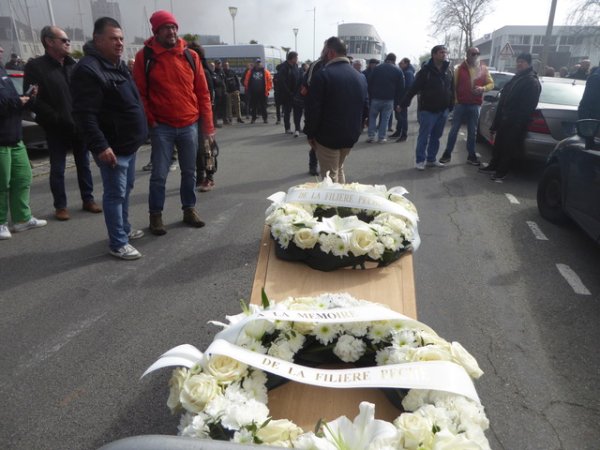Violence particularly directed against the MPA Agency
On 30 March, in Brest, the headquarters of the French Office for Biodiversity, which is responsible for MPAs, more than 500 fishermen attacked the OFB site with more than 300 emergency flares, destroying the windows during a demonstration. The following night, the building burnt down, probably as a result of a fire started by one of these flares. The emotions and rage of the fishermen were heightened by the fact that in a nearby dock several boats condemned as a result of Brexit were being destroyed. In addition, the sight of a Sea Shepherd poster celebrating the end of fishing in a nearby area would have added to the fishermen’s anger. In the following days, other demonstrations were organised, in a calm atmosphere, at the initiative of the fisheries committees in almost all French fishing ports. In these well-attended demonstrations, the frequent presence of coffins symbolised the widespread fear of a programmed collapse of French fishing.

We can also recall that in Brest, in February 2022, President Macron organised the "One Ocean Summit", where he promoted the policy of generalising MPAs, in the absence of any fishermen’s representatives. Associations had protested by organising a counter summit : "the Uprising of the Sea".
Anger against authoritarian European policies and BINGOs
A Breton fisherman (troller) strongly expressed what artisanal fishermen, from small-scale fishing to deep-sea fishing, feel. "Today fishing is at the tipping point, the point where the whole sector can collapse, some will be happy about it perhaps, but how many will suffer or die ?... The foundation of this whole great sector is FRENCH ARTISANAL FISHING ! If the restrictions imposed by Europe and dictated by a few NGOs are applied, such as the complete ban on trawling by 2030 or the closure of several fishing areas within 6 months, not only, they won’t protect the sea, but they will destroy this industry and simply kill the sentinels of the sea that we are ! This will always be to the benefit of foreign-owned industrial fishing and increased imports with a dramatic carbon footprint !
We have undergone restrictions, closures, crises, fleet reductions, ever more stringent quotas, we are always doing more to evolve, improve, protect and preserve ! The transmission of our knowledge, the valorisation of this cultural and ancestral tradition, the conservation of this heritage and the action of an ever more sustainable and responsible fishing are clearly our objectives ! Our actions, which attest to our efforts, are never put on display for all to see ! [1]
For its part, thenational Fisheries Committee denounced the European Commission’s contempt for the work undertaken at local level by fishermen, in conjunction with scientists, to participate in fisheries risk analyses, sweeping aside this commitment with its action plan oriented a priori towards the banning of bottom gears. Such a measure threatens fisheries such as langoustines and scallops, which provide an essential income base for many coastal fishermen. But beyond that, all fisheries could be affected, such as traps and bottom longlines, but also the trollers who depend partly on trawlers for their bait. Even oyster farmers who use dredges and clean the foreshores for flat bed breeding can be affected.
Olivier Le Nezet, the president of the National Fisheries Committee, said in an open letter to President Macron : "The news about our industry have become unbearable... I have never seen such an outpouring of attacks... I see that we have entered a new society, that of the government of NGOs and radicalised environmental associations... These pressure groups systematically use all the media strings without scruples... Environment is all that matters, the fisherman disappears from the horizon, man becomes a negligible entity. It is very clear, they simply want the end of our activity... Exasperation is at its height with the European Commission which follows the same idea with its action plan for resilient fisheries or, how to promote a dark future now for a better future in 40 years’ time, but there will be no more fishermen... And the Commission, in its bureaucratic ivory tower, explains that it is going to help us to reconvert our fishing boats for recreational fishing, tourism and the gathering of waste in the sea ! The fisheries committees were all the more affected by this disregard for their action as some fishermen, sometimes supported by the extreme right wing, contested their participation in risk studies, negotiations on wind farms and marine spatial planning.
The coup de grâce : the ban on fishing to protect dolphins
The decision that sent fishermen into a frenzy was the court decision to ban fishing for several months in the Bay of Biscay to protect dolphins. This decision follows legal action by several NGOs. For the past three years, Sea Shepherd has been harassing fishermen at sea following a significant increase in the number of strandings of dolphins, most of which were asphyxiated in fishing nets. These cetaceans are very numerous, 200,000 all year round in the Gulf and 200,000 more during the summer. They consume about 1 million tons of pelagic fish, while the fishery represents only a few tens of thousands of tons. They have always been in direct competition with the fishermen and at the beginning of the 20th century there were even bonuses for killing them. Today, all fishermen regret catching them accidentally. For some unknown reason, related to the presence of abundant food, they have moved closer to the coast, where gillnetters and some trawlers catch them accidentally. Winter storms and currents bring their corpses to the coast. These beached dolphins and the Sea Shepherd images of dolphins in nets have triggered a dramatic emotion that has led public opinion and part of the press to call the fishermen as criminals. We know that it only took a few images of dolphins in driftnets to lead the United Nations to ban driftnets. Several French fishing ports have not recovered from this ban. The dolphins, which are very numerous, are not under immediate threat and fishermen are looking for solutions to repel the dolphins during fishing operations. But NGOs and some scientists reject these measures because, according to them, they would prevent the dolphins from feeding. The only solution is therefore a ban for several months, which would quickly condemn hundreds of boats. Fisherman Christopher Quemener understands this well : "Unfortunately, we can see today that the lack of knowledge of the ’decision-makers’ about the maritime environment leads to aberrations and that calculated data, through algorithms, aims at replacing reality, our reality, the one that we live, that we describe but that nobody follows ! The dolphin is an example of this, who better than us to love it, how can one think that we want to capture it or, worse, that we don’t care about capturing it, on the contrary we avoid it when fishing in order to better observe it while underway ! [2]
Fishermen against blue apartheid
By attacking the OFB, the fishermen are questioning the 30 x 30 policy (30% MPAs by 2030) promoted by international organisations, which should be validated in 2024 at a United Nations conference in France. France is indeed, with Costa Rica, one of the countries most committed to this policy of generalising MPAs. The French government is now trapped by the effects of this policy on French fishermen. Several organisations supporting or representing artisanal fishermen have spoken out against this policy and signed a declaration in June 2022 denouncing "blue enclosures" and even "blue apartheid" ; a strong concept to denounce the exclusionary policy that results from marine spatial planning.
"Through the commitments of 30X30 biodiversity targets, 30% of our coastland is being slated out for ’conservation’ purposes, bringing it under marine protected or conservation areas. The remaining coastal lands are taken for coastal economic zones as beaches for tourism, sites for energy extraction, petrochemical hubs, ports, and so on... The introduction of "climate resilient infrastructures" for "sustainable ocean economies", alienating the stakes of the ocean people on the ocean and its resources, is nothing less but "climate colonisation". In this context, where are we, the people of the ocean, expected to go ? This is our homeland. Where are our rights ? This is a process of Blue Apartheid, of constantly dispossessing our people of customary rights, perpetrated through ’blue fencing’." [3]
This shows the challenge that French fishermen want to take up : to challenge a locked-in international policy, designed out of their control and therefore against them. They will never be able to do it alone. The WFF (World Fishworkers Forum) has expressed its solidarity. But it would take a powerful mobilisation of national and international organisations of artisanal fishermen to have an impact before and during this decisive international conference, in France, in 2024.
From local to global, for a democratic management of the oceans : parliaments of the sea
Democratising the management of the oceans is a necessity and this necessarily requires the representation of fishing communities in decision-making bodies, just like the indigenous peoples who have obtained this recognition of their rights and responsibilities. Today, only the FAO attaches importance to the representation of fishermen. It promotes the Voluntary Guidelines for Small-scale Fishing, which constitute a framework for democratisation that can only work if it starts at the grassroots level, on the coasts, in order to respond to the specificities of various environments, histories and cultures. It is within such a framework that the question of fishing gears can be approached calmly. With regard to bottom fishing gears, an IFREMER scientist noted : "There are several ways of reconciling bottom fishing and the preservation of ecosystems. For sensitive and vulnerable marine habitats, only a ban on bottom fishing will enable them to be preserved. For less sensitive habitats, the issue could be dealt with on a case-by-case basis with spatial measures (MPAs) or changes in fishing techniques ". [4] But it should be remembered that MPAs without fishing do not always guarantee an improvement in fisheries resources because these depend on a number of factors, including the evolution of the environment.
There is a democratic and sustainable tool for managing coastal areas that can serve as a model. It is the Iroise Natural Marine Park in Brittany. It was created because the fishermen supported it after long debates. The park is chaired by an elected representative and brings together fishermen, scientists, elected representatives and local environmental associations. It recognises the responsibility of fishermen in the management of fisheries resources while ensuring a permanent debate between them and the other stakeholders. Together, they can oppose onshore investments that may threaten the quality of coastal waters. The experience is conclusive and has led to progress in the management of important resources such as seaweed and lobsters. These democratic procedures take time, but they are more effective than oukases. However, the European Commission, the big environmental NGOs, consider that it is not an MPA because it does not prohibit fishing, except in a few areas. Instead of an authoritarian management of marine areas, it reflects a more global and ecosystemic approach, integrating the human dimension of management and prefiguring a legal system in which the stakeholders involved with the sea could impose measures on land to protect the quality of the waters. Such a model, in which the rights of fishermen are recognised and the voice of other stakeholders respected, could foreshadow the generalisation of parliaments of the sea.
Alain Le Sann
Co-president of Collectif Pêche et Développement
Translated by Danièle Le Sann
 Collectif Pêche et Développement
Pêcher pour vivre
Collectif Pêche et Développement
Pêcher pour vivre
